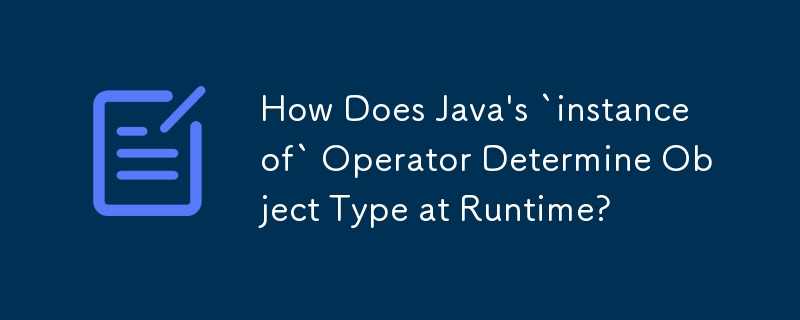
探索Java 中的instanceof 運算子
instanceof 運算子是Java 類型系統的一個組成部分,讓您可以確定運行時類型一個對象並做出相應的響應。
使用instanceof時,您可以將物件參考與類型進行比較。語法遵循以下模式:
expression instanceof Type
比較的結果是一個布林值,指示該物件是否為指定類型的實例。例如,給定以下程式碼:
if (source instanceof Button) {
//...
} else {
//...
}如果 source 是 Button 類別的實例,則 if 語句的計算結果將為 true,並且區塊中的程式碼將執行。如果 source 不是 Button,則會執行 else 語句。
為了理解這個概念,讓我們考慮一個簡化的類層次結構:
interface Domestic {}
class Animal {}
class Dog extends Animal implements Domestic {}如果創建一個Dog 物件並進行比較它使用instanceof:
Dog dog = new Dog(); System.out.println(dog instanceof Domestic); // true System.out.println(dog instanceof Animal); // true System.out.println(dog instanceof Dog); // true
結果是有意義的,因為Dog是Domestic和Animal的子類型。它也擴展了 Dog 類別本身。但是,如果您嘗試將其與不同的子類型進行比較:
System.out.println(dog instanceof Cat); // compilation error
這將導致編譯錯誤,因為 Dog 不是 Cat 的子類型。
instanceof 運算子特別有用用於在處理多態行為時確定物件的執行時間類型。考慮這樣一個場景,您有多個從公共基類繼承的類型:
class Shape {}
class Circle extends Shape {}
class Square extends Shape {}在接受Shape 物件作為參數的方法中,您可以使用instanceof 來區分特定類型:
public void drawShape(Shape shape) {
if (shape instanceof Circle) {
// Draw circle
} else if (shape instanceof Square) {
// Draw square
} else {
// Handle other shapes
}
}透過使用instanceof,您可以在運行時回應不同類型的對象,使您的程式碼更加靈活和適應性強。
以上是Java 的「instanceof」運算子如何在執行時間確定物件類型?的詳細內容。更多資訊請關注PHP中文網其他相關文章!




